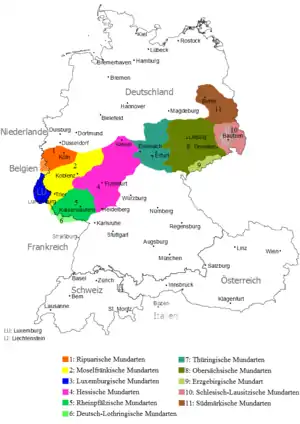East Central German
East Central German (German: Ostmitteldeutsch) is the eastern, non-Franconian Central German language, part of High German. Present-day Standard German as a High German variant[1] has actually developed from a compromise of East Central (especially Upper Saxon promoted by Johann Christoph Gottsched) and East Franconian German. East Central German dialects are mainly spoken in Central Germany and parts of Brandenburg, and were formerly also spoken in Silesia and Bohemia.
| East Central German | |
|---|---|
| Ostmitteldeutsch | |
| Geographic distribution | Thuringia, Saxony, Berlin, Brandenburg |
| Linguistic classification | Indo-European
|
| Subdivisions | |
| Glottolog | east2832 (East Middle German) uppe1400 (Central East Middle German) |
 Central German dialects after 1945 and the expulsions of the Germans from their eastern homelands
Thuringian (7)
Upper Saxon (8)
Erzgebirgisch (9)
Lusatian (10)
| |
Dialects
East Central German is spoken in large parts of what is today known as the cultural area of Central Germany (Mitteldeutschland). It comprises:[2]
- Central East Central German
- Thuringian (Thüringisch)
- Upper Saxon German (Obersächsisch)
- High Prussian (Hochpreußisch) (nearly extinct)
- Lausitzisch-Neumärkisch, as distinct from Low German Brandenburgish
- Südmärkisch
- Lower and Upper Lusatian (Lausitzisch)
- Schlesisch–Wilmesau
- Silesian German (Schlesisch) (nearly extinct)
- Wymysorys
- Yiddish
See also
Further reading
- Keller, R. E. (1960) German Dialects: phonology and morphology. Manchester University Press.
References
- "Ethnologue: East Middle German". Retrieved 2010-11-24.
- Hammarström, Harald; Forke, Robert; Haspelmath, Martin; Bank, Sebastian, eds. (2020). "East Middle German". Glottolog 4.3.
This article is issued from Wikipedia. The text is licensed under Creative Commons - Attribution - Sharealike. Additional terms may apply for the media files.